14
Swimmers at Gimli beach
1940
Gimli, Manitoba

15
Crash landing at Gimli
1945
Gimli Airbase
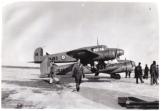
16
The arrival of the Royal Canadian Airforce in 1943 had an enormous impact on the economic growth and social development of Gimli, argueably second only to the arrival of the first Icelandic settlers. In September 1943, the R.C.A.F. opened a Service Flying Training School to train pilots from the British Commonwealth Air Training Plan. The airforce base quickly became the centre of most social life in the community and its presence injected large sums of money into the local economy.
17
Fishing vessels at Gimli harbour
1940
Gimli, Manitoba
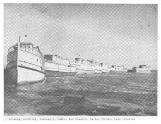
18
Fishing was an important part of the economy of Gimli in both winter and summer. In addition Gimli became an important port for the movement and supply of goods up the lake and fish from northern points on the lake. From sailboats, small skiffs, whitefish boats and lake freighters, the fishing industry added to the economic development of the community.
19
Gimli Harbour circa 1940
1940
Gimli, Manitoba
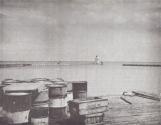
20
Ice fishing with a Bombardier and fish hut in tow
1935
Lake Winnipeg near Gimli
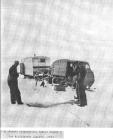
21
Threshing on a farm in Gimli
1939
Gimli, Manitoba

22
Farming was also an important primary industry in the community. While land capabilities for agriculture are limited in the area, dairy, beef cattle, grain and feed crops all played an important role in contributing to local food supplies and to the economy. The use of work horses continued in the area well into the 40's and in some cases until the 1950's.
23
Dairy cattle at the Arnason farm south of Gimli.
1950
South of Gimli
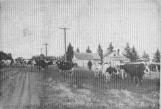
24
Horses on J. A. Bjornsson farm
1935
Gimli, Manitoba
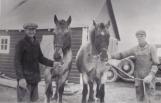
25
Burbank Kristjanson in downtown Gimli in the mid 1930's.
1935
Gimli, Manitoba
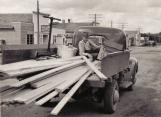
26
The 1930's brought the same tough economic conditions as were experienced elsewhere in the country. However, building and commercial businesses continued.
27
Downtown Gimli 1940
1940
Gimli, Manitoba Centre Street 1940's
